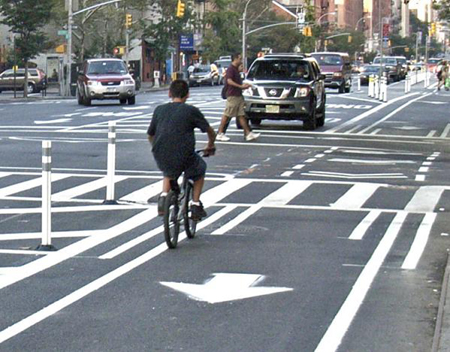
There are two ways to apply cycling laws, education or enforcement. Going to school in the UK at least twice a year there would be a special lesson on the Highway Code.
A little Highway Code book would be given to us to take home and keep. It not only had all the rules and laws as applied to driving a car, it laid out those that applied to riding a bicycle and pedestrians.
It was drummed into us, when you cross the street, stop, look right, look left, look right again; (Traffic came from the right in the UK.) if the road is clear then cross.
This was war time Britain of the 1940s and due to petrol rationing there were few cars on the road, especially in the rural area I lived at the time. Never-the-less when we crossed the street we went through this ritual of look right, look left.
There were cycling proficiency tests too, where we would bring our bikes to school and the local police constable would come in and instruct us on how to ride our bike both safely and in compliance with the law.
The result was when I started cycling seriously in the 1950s, I never rode on the pavement, (Sidewalk.) I never rode through red lights, and my bike always had a front and rear light when riding after dark. As for riding a bike on the wrong side of the road, toward traffic, that would be so crazy it would not even be considered.
It was somewhat of a culture shock when I came to the US in 1979 and went for a ride with the local club. The first red light we came to I stopped and everyone else kept going.
It would not be unusual to find a cyclist riding towards me on my side of the road. This led to the quandary, do I pull out in the traffic lane and let him pass on the inside, or hold my course and hope he goes around me? I usually took the initiative and went for the first option.
I remember reading of a case in New Jersey where two cyclists riding at night without lights hit head on because one was on the wrong side. Their heads hit, neither was wearing a helmet; one died instantly, the other had serious head injuries.
Young kids on BMX bikes would jump from the sidewalk to the center of the road, and then wait for a gap in opposing traffic before hopping over to the opposite sidewalk. It was a free for all, with no rules being observed or enforced. Today, from what I read, it is no better in the UK; it seems the Highway Code is no longer taught in schools.
Stuff drummed into me as a kid has stayed with me to this day; so believe me I understand why some cyclists ride through red lights. It is what they have always done since they were a kid; no one said they shouldn't do it.
If I stop for a red light, even if there is no other traffic in sight, it is not because I am somehow better than the cyclist who just rides on through. It is because not to stop feels uncomfortable, and goes against a lifetime habit.
Getting in the habit of obeying traffic laws while riding a bike would be a good thing for all cyclists to do right now. I am reading of a ticket writing blitz going on in Brooklyn, New York; it will not surprise me if this happens in other cities in the US as cycling becomes more popular and more and more cyclists take to the streets.
The article in The Brooklyn Paper tells how critics are saying it is unfair to clamp down on cyclists in this manner. I am inclined to agree to a certain extent. It is unfair that a cyclist should pay the same $190 fine for running a red light that a motorist has to pay.
However, it is quite simple to avoid getting one of these tickets; don't run red lights. Also, whoever said life is fair? It is unfair that I am forced to take my shoes off at the airport, because one idiot tried to blow up a plane with a bomb in his shoe.
One Brooklyn cyclist got three tickets; one for riding his bike on the sidewalk, another riding against the flow of traffic, and a third for mouthing off to the cop who was giving him the ticket. All three of these tickets could have been avoided, had this particular cyclist not become accustomed to riding his bike where ever and however he please.
Laws regarding cyclists running red lights and other infractions are in place everywhere right now, so too are fines set. Because the police have not enforced these laws in the past, it may seem unfair when they suddenly start issuing tickets.
There are ways to get people to follow the rules. You educate, preferably at an early age as happened with me, it then becomes a lifetime habit. Or you start fining people as a deterrent.
I find obeying the law as I ride my bike, does not affect my cycling pleasure; it does not slow me down all that much either. And if my local law enforcement starts issuing tickets to cyclists, it will not affect me.
Those who get tickets will no doubt say how unfair it is, and how they’ve always ridden on the sidewalk or went through red lights. I may sympathize, but I doubt I will be offering to pay their fine.
Source: http://davesbikeblog.squarespace.com/blog/2011/4/7/education-or-enforcement.html
Daniel S. Antunez Jane B. Cruz Michael F. Nichols Alfred C. Morris





No comments:
Post a Comment